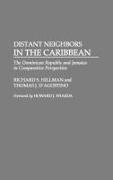Read more
This study in comparative politics provides a comparison and contrast in the political development of two countries with divergent historical influences--the Dominican Republic and Jamaica. Although situated in close geographical proximity to each other and to the United States, Jamaica and the Dominican Republic are island nations generally considered separately in the fields of Latin American and Commonwealth Caribbean politics. The mutually exclusive treatment of Caribbean countries with Hispanic traditions and those with British traditions is common in the literature and may be attributed to increased specialization, misunderstanding, and inattention to important commonalities between the cultures. This work pulls together the common themes and patterns, developing a single framework for analyzing patterns in colonial legacies, the gaining of independence, formation of political institutions, the emergence of political leadership, and the creation and implementation of policies in the two states. The background and contemporary developments of both the Dominican Republic and Jamaica are treated within the context of this framework.
This work will be of interest to scholars in Caribbean studies, Latin American studies, comparative and international politics, and sociologists specializing in comparative cultures.
List of contents
Foreword by Howard J. Wiarda
Preface
IntroductionA Comparative Approach
History and Political CultureLegacies of the Past
rocioeconomic and Political Patterns
Political Institutions and ProcessesGovernmental Structures and Administration
Political Parties and Elections
Political Influences and OutcomesPolitical Forces and Interest Groups
Public Policies
Comparative Perspectives
Bibliography
Index
About the author
Richard S. Hillman

